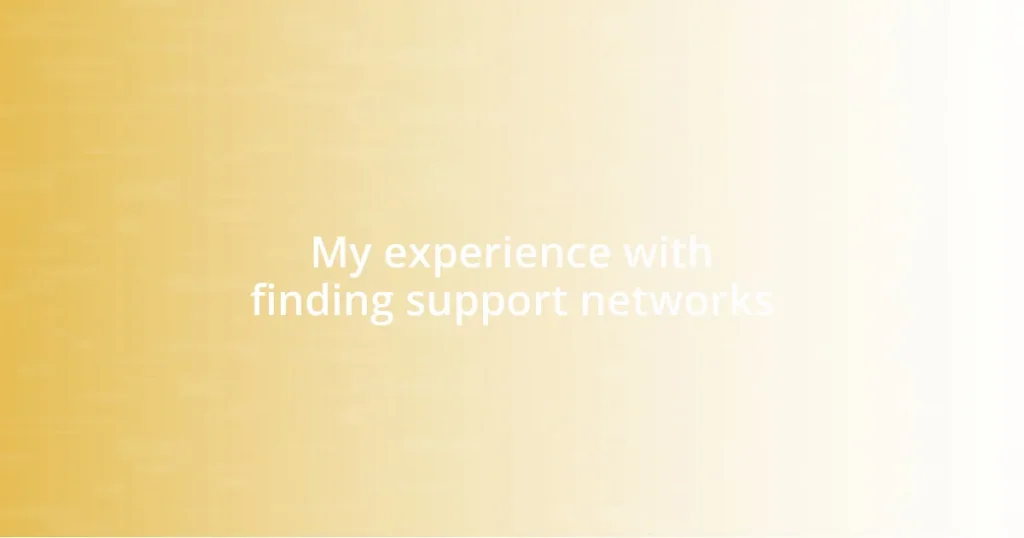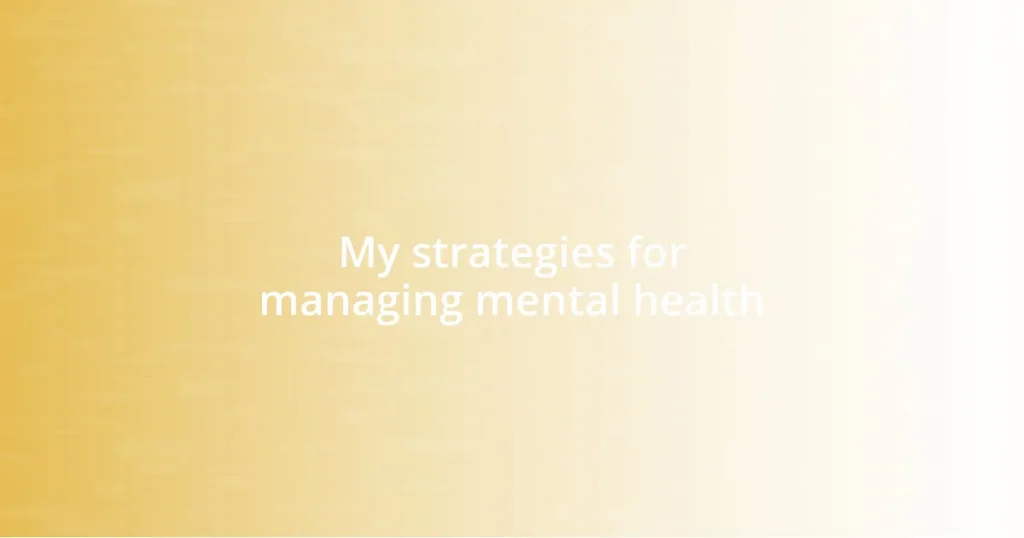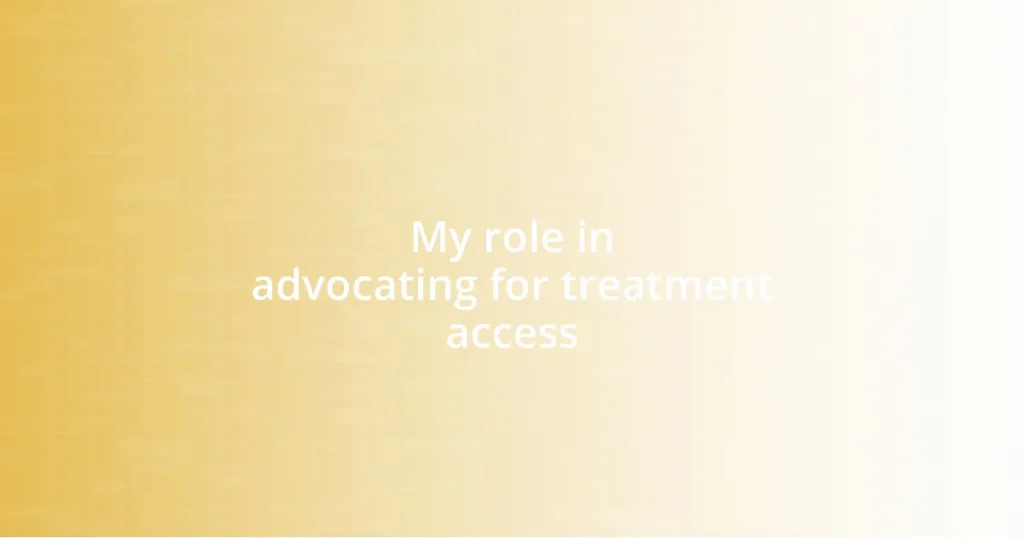Key takeaways:
- Support networks provide emotional comfort, practical advice, and a sense of belonging during challenging times.
- Identifying personal needs is crucial for seeking the right support connections that resonate with individual circumstances.
- Researching local resources and engaging in group activities can enhance support networks and create meaningful connections.
- Vulnerability and reciprocity in support networks are key to personal growth and building stronger relationships.
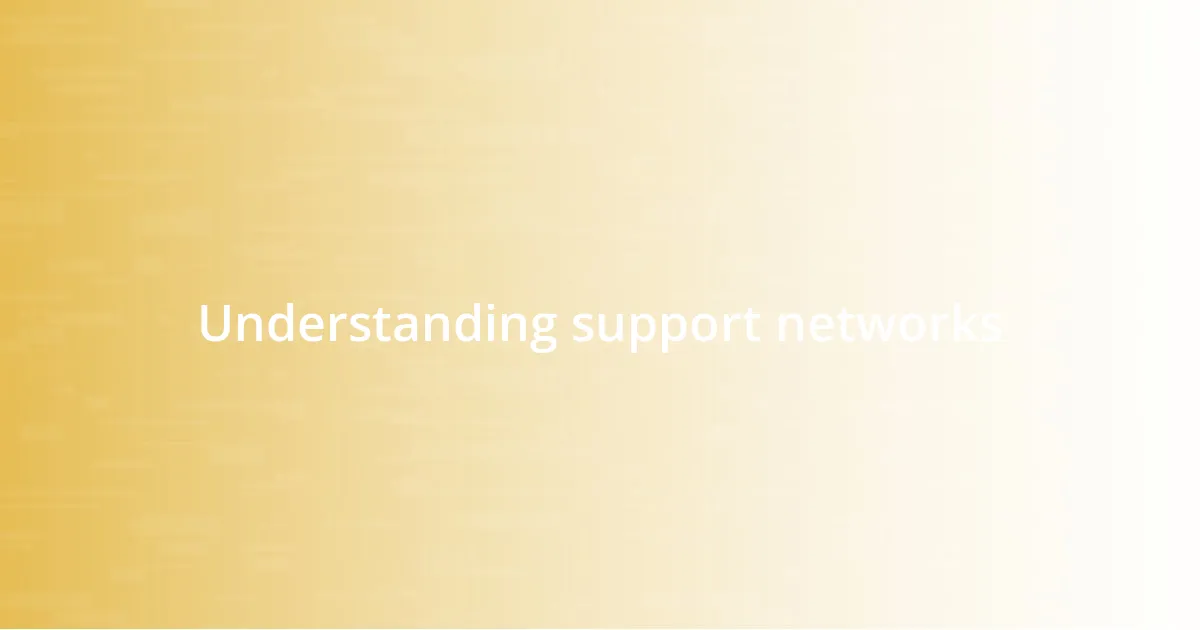
Understanding support networks
Support networks are incredibly valuable, providing us with a safety net during challenging times. I remember feeling overwhelmed and uncertain after a job loss; reaching out to friends and family not only offered me comfort but also practical advice. Have you ever found yourself in a situation where the right words from someone close made all the difference?
Understanding these networks means recognizing the diverse forms they can take. They can be friends, family, coworkers, or even online communities. When I joined a local support group for those seeking employment, I discovered a community that was not only sympathetic but also filled with shared experiences. It was enlightening to see how isolation could transform into camaraderie simply by connecting with others who understand your struggles.
To truly appreciate the importance of a support network, it’s essential to acknowledge the emotional layer they provide. These connections often foster feelings of belonging and acceptance. I still recall the first time I shared my fears in that group; the genuine responses I received made me feel seen and understood. Have you ever experienced a moment where a shared emotion sparked a deeper connection with someone? It’s these moments that highlight the profound impact support networks can have on our lives.
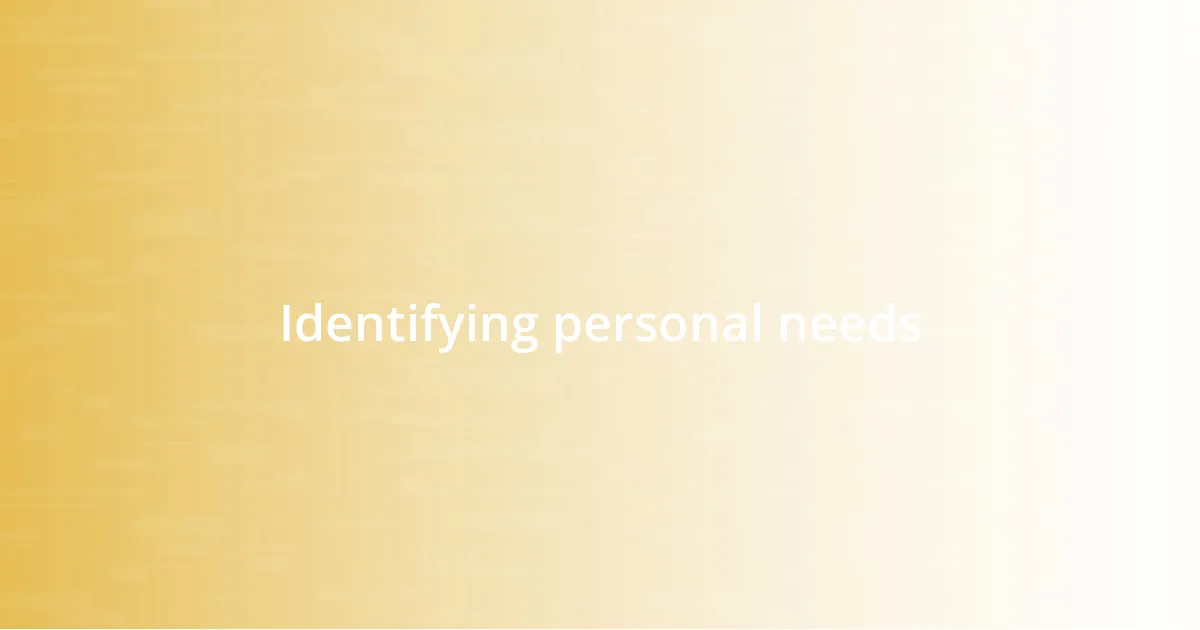
Identifying personal needs
Identifying what you truly need from a support network is a critical first step. I remember sitting down and reflecting on my feelings during tough times, realizing that some days I craved emotional support, while other days I needed practical advice. This revelation was a game changer, as it allowed me to seek out the right types of connections that would truly resonate with my needs.
To help you sift through your thoughts and pinpoint what you’re looking for, consider these factors:
– Emotional Support: Do you need someone who will just listen and understand your feelings?
– Practical Guidance: Are you looking for people who can provide concrete advice or resources?
– Shared Experiences: Do you want to connect with those who have faced similar challenges or hardships?
– Accountability: Would you benefit from having someone to motivate you or keep you on track?
– Validation: Are you seeking affirmation of your feelings and struggles from others?
By mapping out what you need, you can avoid wasting time on connections that don’t serve you, and instead, nurture relationships that uplift you. I learned this the hard way; after joining a group that was too focused on sharing complaints rather than solutions, I quickly realized that wasn’t what I needed. Finding clarity around my personal needs made all the difference in building a supportive network that genuinely helped me grow.
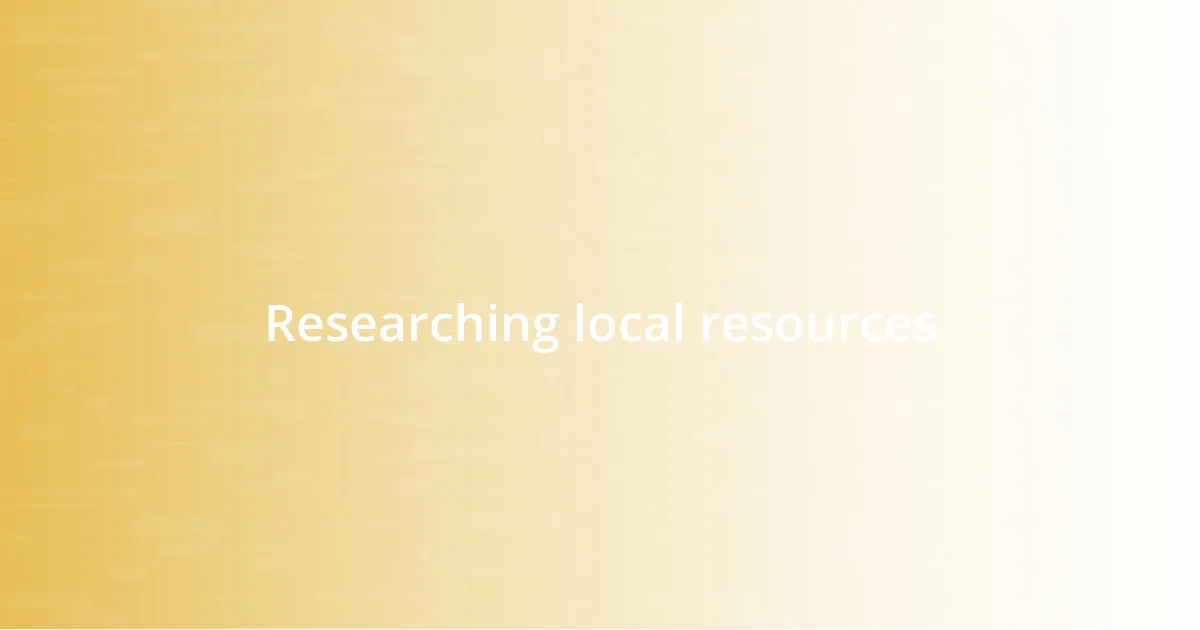
Researching local resources
Researching local resources has been an essential part of building my support network. I found that a simple online search could yield a plethora of options. When I started looking for local support groups, I was genuinely surprised by how many were readily available. Not only did I come across organizations dedicated to career transitions, but I also discovered community centers hosting workshops on resilience and mental wellness. Isn’t it amazing how many resources we might overlook until we actively seek them out?
Another effective strategy was visiting local community boards or libraries, where I found information on support groups and services aligned with my needs. I remember one day flipping through a local magazine that featured a story about community gardens, and I learned that many of them also host support meetings! Engaging with those who live in my area opened up countless avenues for connection. Have you ever thought about how sometimes the most unexpected places can lead to incredible opportunities? It’s often through these uncharted routes that we forge meaningful relationships.
The key takeaway for me was understanding the importance of being proactive. Attending local events or workshops not only provided direct support but also helped me meet face-to-face with others in similar life stages. I’m reminded of the moment I participated in a community art therapy session. The experience fostered a sense of camaraderie and expressed emotions I had kept bottled up for far too long. It was refreshing to connect with others while engaging in creative expression. How might stepping out of your comfort zone lead to new connections for you?
| Resource Type | Access Method |
|---|---|
| Support Groups | Online Search or Local Listings |
| Community Centers | Visit in Person or Check Websites |
| Workshops and Classes | Local Libraries or Community Boards |
| Local Events | Join Community Social Media Groups |
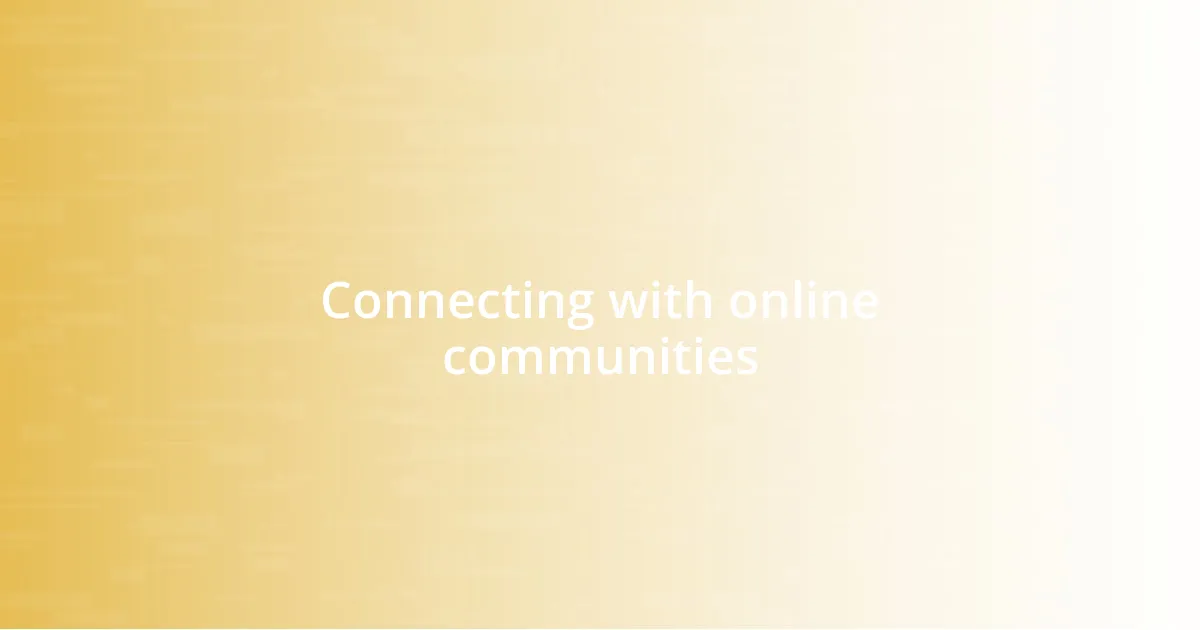
Connecting with online communities
Connecting with online communities can truly transform the support that’s available to you. I remember the first time I joined an online forum dedicated to my specific interests; it felt like discovering a hidden treasure trove. I immediately encountered people who understood my struggles and shared their own stories. It was comforting to realize I wasn’t alone in my experiences—there’s something incredibly validating about finding your tribe, wouldn’t you agree?
As I engaged in various discussions, I discovered that online platforms often provide a level of anonymity that can be liberating. I could express my feelings without fear of judgment. I once shared a particularly vulnerable moment, and the outpouring of support was overwhelming. People offered personal insights and encouragement, which made me reflect on how powerful it can be to connect with others from the comfort of your own home. Have you ever thought about how a single message can impact your day in such a significant way?
Participating in these online spaces led me to realize the potential for creating genuine connections. I often engaged in video calls and virtual meetups, which made the experience feel more personal. One night, I joined a group for a virtual coffee chat, and to my surprise, one participant turned into a great friend. The connection deepened beyond the screen, proving that support can transcend physical boundaries. Isn’t it fascinating how technology enables us to form bonds that might not happen otherwise?
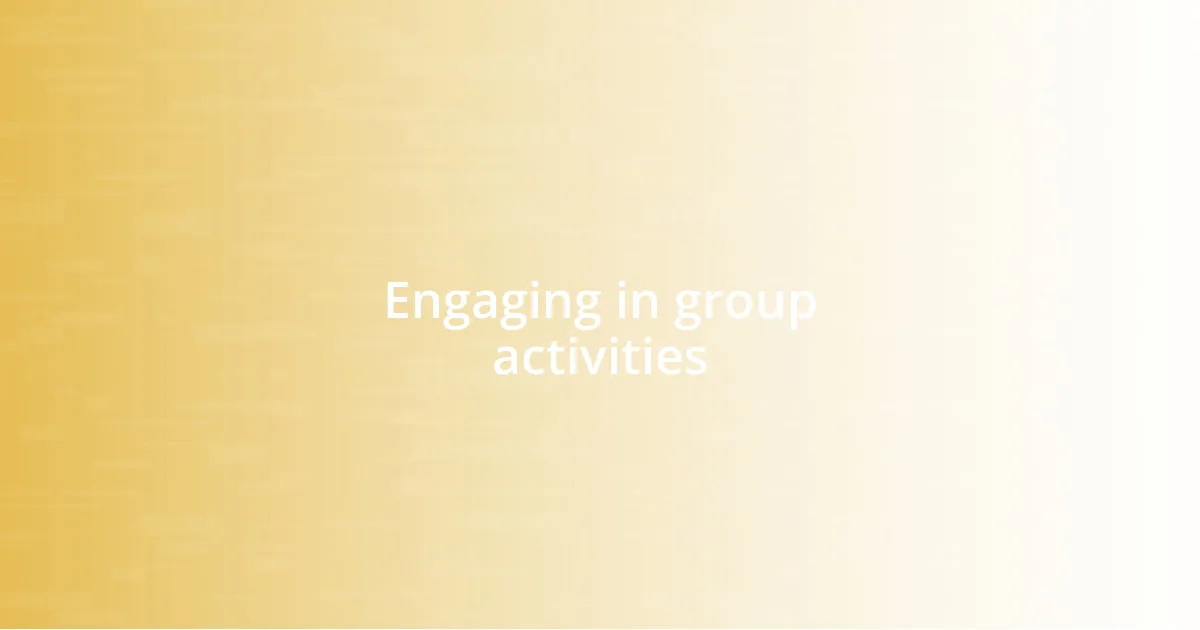
Engaging in group activities
Engaging in group activities offered me a sense of belonging that I didn’t quite anticipate. I remember my first experience with a local hiking club. Initially, I felt hesitant, wondering if I would connect with anyone, but as we trekked through the beautiful trails, conversations flowed naturally. The shared effort and appreciation for nature bridged gaps and built instant rapport. Have you ever noticed how a simple activity can dissolve barriers?
One pivotal moment was during a community cooking class, where we collaborated to create a meal from scratch. I felt my anxiety melt away as everyone shared their culinary secrets. It was not just about the food; it was about the chatter, laughter, and the joy of creating together. When the aromas filled the room, I felt a wave of gratitude wash over me. Isn’t it extraordinary how food can forge bonds between strangers?
I’ve also found that group activities can lead to unexpected connections. I participated in a book club that initially intimidated me; I didn’t know anyone. However, discussing our interpretations of the stories opened up avenues for deeper conversations. One member and I realized we had parallel life experiences, and we began meeting outside of the club for coffee. Those little moments of bonding are what I cherish most. Could it be that in these casual settings, we discover friendships that last?
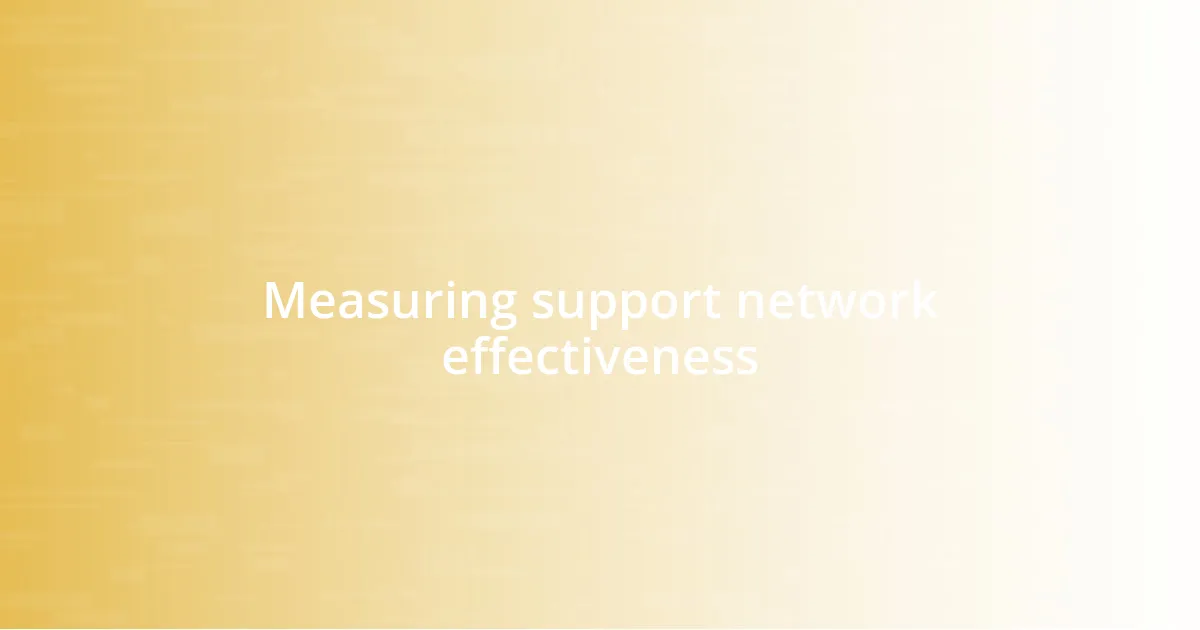
Measuring support network effectiveness
Measuring the effectiveness of a support network can sometimes feel like navigating uncharted waters. I once sought feedback from my peers after a series of group meetings. Their candid insights revealed how our shared experiences not only provided emotional comfort but also practical advice that I hadn’t initially recognized as valuable. It was a revelation; sometimes, it’s the little things that signal the strength of a connection. Have you ever considered what feedback can reveal about your own support system?
One method I found particularly effective is tracking my emotional highs and lows before and after interactions with my support network. I created a simple journal where I noted my feelings and thoughts following each meeting or conversation. Over time, patterns emerged, illuminating which connections uplifted me and which left me feeling drained. Isn’t it fascinating how self-reflection can enhance our understanding of relationships and their impact on our well-being?
Lastly, I learned that it’s essential to look at the longevity of these connections. I remember a friend from my support group who offered unwavering encouragement during a tough time. Months later, when we faced our own challenges, we naturally gravitated toward each other. This reciprocity made me realize that the most effective support networks are those where both parties contribute, creating a powerful cycle of giving and receiving. How do you define the lasting value of your own support connections?
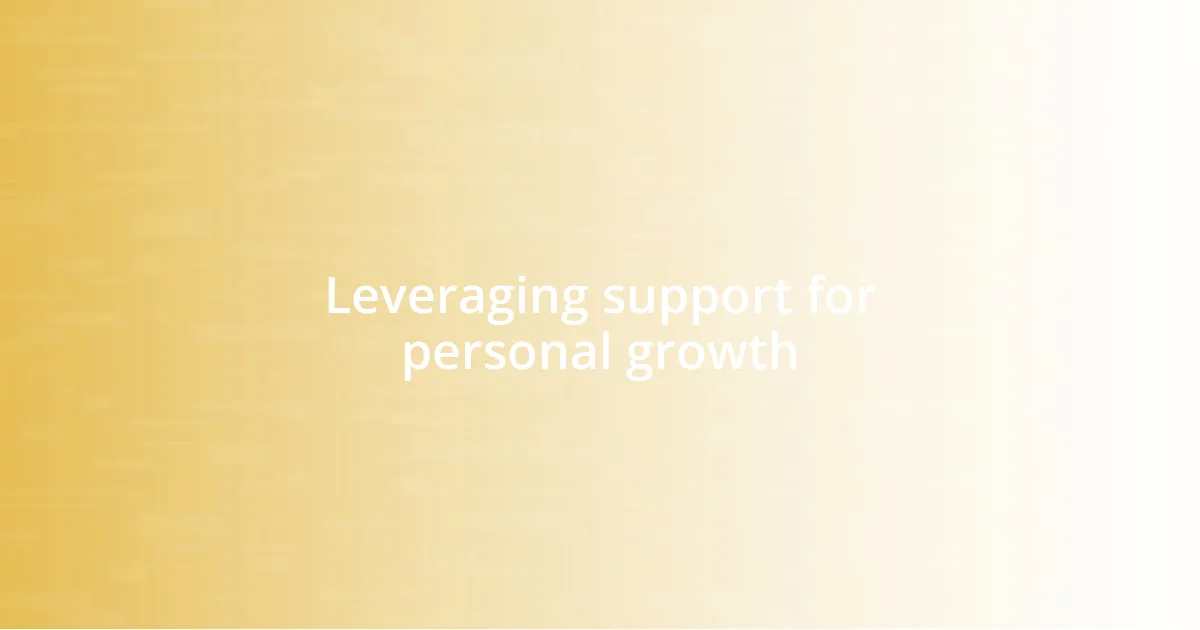
Leveraging support for personal growth
When it comes to leveraging support for personal growth, I’ve found that being vulnerable is crucial. I remember opening up about my struggles in a discussion circle, feeling both terrified and relieved. The room seemed to breathe with a collective understanding, and I realized that sharing my experiences not only lightened my own burden but also encouraged others to share. Could it be that vulnerability is the secret ingredient to building stronger relationships?
Equally impactful is the idea of giving back to my support network. I recall a time when my friends rallied around me through a difficult job search. Later, when a friend faced uncertainty in her career, I was eager to lend my ears and resources. This exchange taught me that growth isn’t solely about receiving support; it’s about nurturing those connections by reinforcing the bonds we share. Have you ever noticed how helping others can also help you grow?
I often think about how setting goals with my support network has pushed me to stretch beyond my comfort zone. During a weekend retreat organized by my peers, we framed our aspirations and held each other accountable. As we shared our progress in subsequent meet-ups, I felt a palpable energy that motivated me to take bold steps toward my goals. It’s fascinating to witness how collective ambition can spur individual journeys. Isn’t it inspiring to see how collaboration can accelerate personal development?










